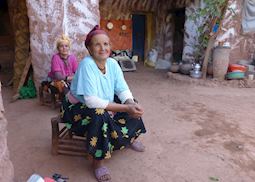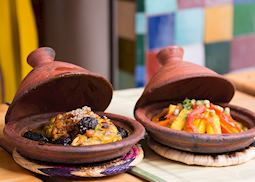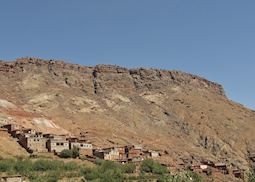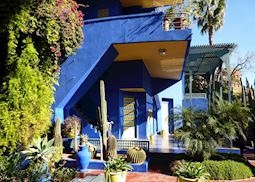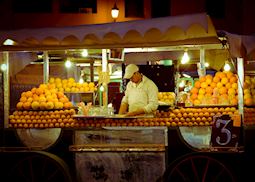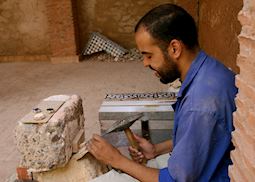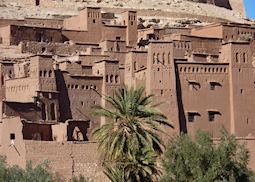
Aït Benhaddou & Telouet Tour
Aït Benhaddou & Telouet Tour
Visit two of Morocco's most famous kasbahs, Aït Benhaddou and Telouet, on a tour through the country's stunning Ouarzazate Valley.
The majority of this guided tour of Marrakesh will be done on foot. In the morning you visit the historical sights, including the Saadian Tombs, the Koutoubia Mosque, and the El Badi Palace. In the afternoon you focus on the arts and crafts of the city visiting the souqs and concluding at the Djemaa El Fna.
The Saadian Tombs largely date to a glorious period in Moroccan history, around the time of Ahmed El Mansour, the Saadian sultan who controlled vast swathes of territory, including the gold fields of West Africa, and many key trade routes. Thanks to this, the throne grew immensely wealthy and when the sultans died they were buried here in some splendor. The tomb halls are beautifully decorated using marble, carved alabaster and delicate zellij mosaic made from glazed tiles. The Alaouites who succeeded the Saadians feared the love the population had for the Saadians, and so built a huge wall around the tombs to ensure they did not become a focus for dissent. Thus the tombs remained hidden and largely unknown until an aerial survey during the French Protectorate revealed their location, and a narrow passage was cut through the surrounding wall.
The Koutoubia Mosque dominates the Marrakesh skyline, with the distinctive three golden balls atop the minaret. The story goes that the wife of Yacoub El Mansour ate three grapes one day during the fast of Ramadan. In penance she melted down all her jewelry and molded them into these three balls.
The minaret displays the classic proportions of all Maghrebi minarets, and each side was individually decorated which can still be seen in the decorative bands of faience that only survive on the top story. El Badi translates as The Incomparable and was a fitting epithet for the palace of Ahmed El Mansour. As befitted a sultan of his wealth, the finest craftsmen from across the world were employed in its construction. The centerpiece was an enormous courtyard where raised paths concealed intricate waterways that irrigated four large gardens, sunk into the ground and filled with beautiful and aromatic trees. Pools and pavilions lined the walls of the courtyard, and it must have been a truly stunning sight. Today the raised walkways, sunken gardens and some of the pools and pavilion ruins remain, mute testimony to the former glory of El Badi.
The souqs of Marrakesh fulfill most people's fantasies of what an Arabian bazaar should be like. Positively labyrinthine, a maze of streets and narrow alleys are divided up into different quarters, each distinguished by the craft practiced there. In the Dyer's Souq you will walk under billowing sheets of cotton, freshly dyed and drying out, whilst the Carpenter's Souq is redolent with the smell of freshly cut wood, being turned into intricate furniture before your eyes and the Metal Souq resounds to the sound of hammers and bellows as lamps, tables and benches are coerced into shape.
At the heart of Marrakesh lies the Djemaa El Fna, an irregular area of open ground. One translation of the name is "Assembly-place of the Dead", a possible reference to a former role as a place of execution. Alternatively it may simply refer to an abortive attempt to build a mosque on the site, but the former explanation is far more intriguing and the one most people are inclined to believe!
The Djemaa El Fna is part market, part traveling fair; a dazzling array of entertainers congregate here every day — jugglers, mime-artists, musicians, fortune-tellers, snake charmers and boxers all ply their trade whilst vendors supply the crowd with freshly squeezed orange juice and all sorts of food. The best time to be here is dusk. The hypnotic beat of the Gnaoua drummers induces an almost trance-like state, and as you wander round, the crowds grow bigger and bigger. Wandering through the food stalls, boiled sheep heads loom out of steamy clouds, backlit by roaring braziers, lending a Gothic aspect to proceedings. To really appreciate the spectacle, take a seat on one of the rooftop terraces of surrounding cafés. From here you can watch circles of people form and dissolve, responding to the ebb and flow of the performances around them.
One of the nicest things about the Djemaa El Fna is the lack of tourist intrusion; the vast majority of the goings-on are for Moroccans, not visitors, and all the performances, recitals, plays and transactions are conducted in Moroccan Arabic.
These activities are designed to give you the most authentic experiences around where you're staying. We work with local guides, who use their knowledge and often a resident's eye to show you the main sights and more out-of-the-way attractions. Our specialists can suggest tours and activities that will introduce you to the local ways of life.
Aït Benhaddou & Telouet Tour
Visit two of Morocco's most famous kasbahs, Aït Benhaddou and Telouet, on a tour through the country's stunning Ouarzazate Valley.
Amazigh Village & Assafou Foundation Visit
Head into the High Atlas Mountains to meet and have a traditional lunch with an Amazigh family before visiting the Assafou Foundation, a charity that supports local children, women and older men who want to further their education.
Cooking course at La Maison Arabe
La Maison Arabe in Marrakesh offers cooking workshops designed for anyone who wishes to discover the pleasures of Moroccan cooking.
Day trip to Kasbah du Toubkal
Head to Kasbah du Toubkal in the High Atlas Mountains for a day of relaxation, mule rides, walks and traditional hammams.
Essaouira Excursion
Visit an ancient Portuguese fortress that dates from the 18th century (formerly called Mogador) and one of the most attractive towns along Morocco’s Atlantic coast.
Guided excursion to the Gardens of Marrakesh
The gardens of Marrakesh are as famous as the medina itself and with or without a particular interest in gardening you will be sure to enjoy time spent in these beautiful retreats.
Marrakesh Tasting Trail
Experience the tastes and smells of Moroccan cuisine with this tour that will take you through the culinary delights of Marrakesh’s Djemaa El Fna and its surrounding souqs.
Photographic Tour of Marrakesh
Pick up your camera for this half-day tour that takes in the workshops of Marrakesh’s artisans, medieval inns and Museum of Photography.
You can enjoy this activity as part of the suggested tours below, or we can weave it into a trip shaped entirely around you.
